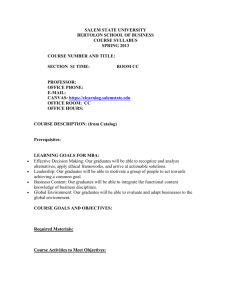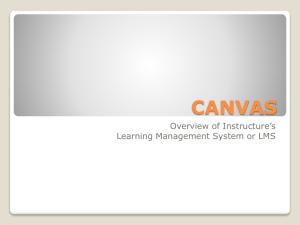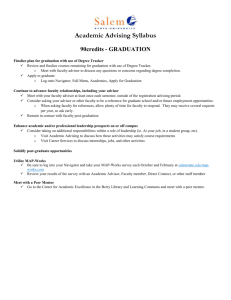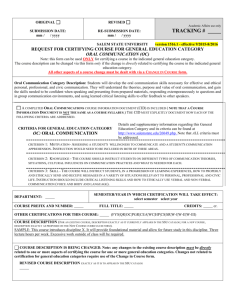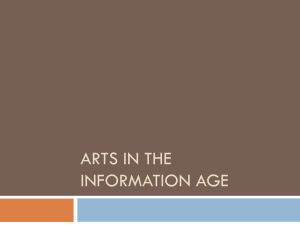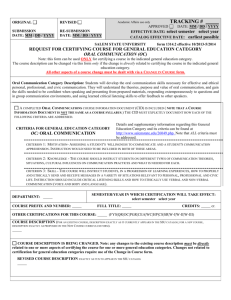IDS 180 MICROCOMPUTER APPLICATIONS
advertisement
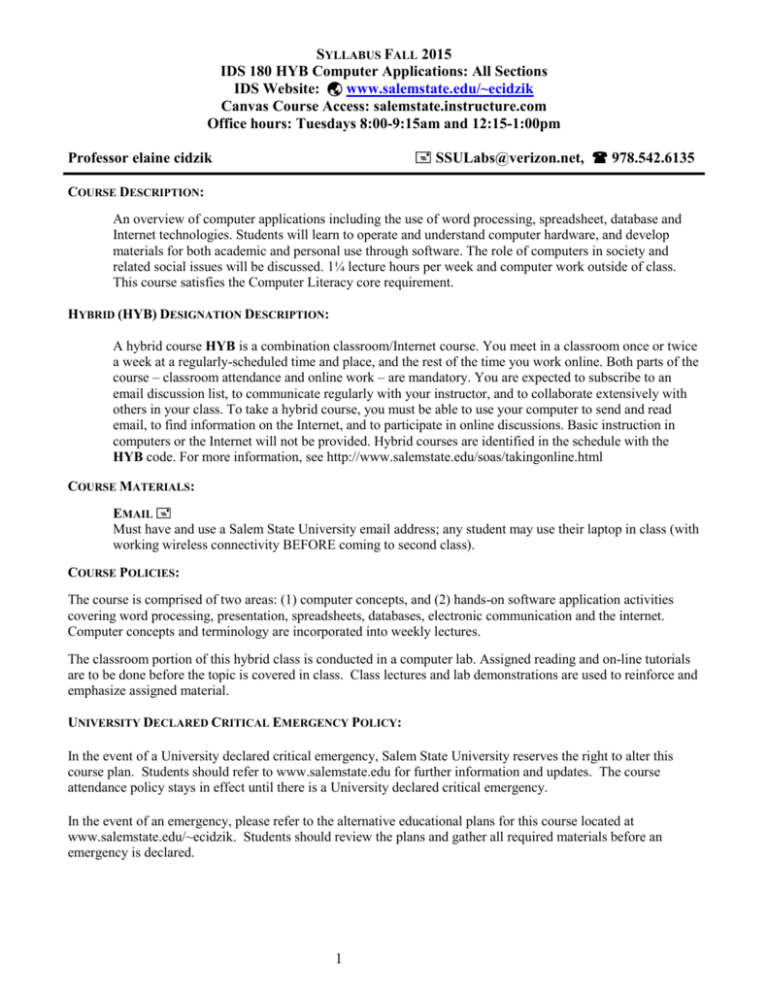
SYLLABUS FALL 2015 IDS 180 HYB Computer Applications: All Sections IDS Website: www.salemstate.edu/~ecidzik Canvas Course Access: salemstate.instructure.com Office hours: Tuesdays 8:00-9:15am and 12:15-1:00pm SSULabs@verizon.net, 978.542.6135 Professor elaine cidzik COURSE DESCRIPTION: An overview of computer applications including the use of word processing, spreadsheet, database and Internet technologies. Students will learn to operate and understand computer hardware, and develop materials for both academic and personal use through software. The role of computers in society and related social issues will be discussed. 1¼ lecture hours per week and computer work outside of class. This course satisfies the Computer Literacy core requirement. HYBRID (HYB) DESIGNATION DESCRIPTION: A hybrid course HYB is a combination classroom/Internet course. You meet in a classroom once or twice a week at a regularly-scheduled time and place, and the rest of the time you work online. Both parts of the course – classroom attendance and online work – are mandatory. You are expected to subscribe to an email discussion list, to communicate regularly with your instructor, and to collaborate extensively with others in your class. To take a hybrid course, you must be able to use your computer to send and read email, to find information on the Internet, and to participate in online discussions. Basic instruction in computers or the Internet will not be provided. Hybrid courses are identified in the schedule with the HYB code. For more information, see http://www.salemstate.edu/soas/takingonline.html COURSE MATERIALS: EMAIL Must have and use a Salem State University email address; any student may use their laptop in class (with working wireless connectivity BEFORE coming to second class). COURSE POLICIES: The course is comprised of two areas: (1) computer concepts, and (2) hands-on software application activities covering word processing, presentation, spreadsheets, databases, electronic communication and the internet. Computer concepts and terminology are incorporated into weekly lectures. The classroom portion of this hybrid class is conducted in a computer lab. Assigned reading and on-line tutorials are to be done before the topic is covered in class. Class lectures and lab demonstrations are used to reinforce and emphasize assigned material. UNIVERSITY DECLARED CRITICAL EMERGENCY POLICY: In the event of a University declared critical emergency, Salem State University reserves the right to alter this course plan. Students should refer to www.salemstate.edu for further information and updates. The course attendance policy stays in effect until there is a University declared critical emergency. In the event of an emergency, please refer to the alternative educational plans for this course located at www.salemstate.edu/~ecidzik. Students should review the plans and gather all required materials before an emergency is declared. 1 SYLLABUS FALL 2015 IDS 180 HYB Computer Applications: All Sections IDS Website: www.salemstate.edu/~ecidzik Canvas Course Access: salemstate.instructure.com Office hours: Tuesdays 8:00-9:15am and 12:15-1:00pm SSULabs@verizon.net, 978.542.6135 Professor elaine cidzik ATTENDANCE Attendance is required. The student is responsible for keeping abreast of all reading assignments, practice exercises, lecture material, and computer assignments whether or not present in class. Assignments are due whether student is present or not. If absent, the student may log in to Canvas to download the missed assignment(s). ACADEMIC DISHONESTY POLICY Using another student’s computer files or any portion thereof as your own work is considered cheating. All forms of dishonesty will be dealt with according to the University’s Academic Dishonesty Policy found on Canvas, http://www.salemstate.instructure.com SOFTWARE Hands-on activities utilizing Microsoft Office 2013 and other laboratory assignments can be done on your laptop or desktop computer, or in any of the University’s computer labs. The University and your instructor will NOT ASSUME any responsibility for issues/problems related to the installation of software on your computer. All computer assignments must be completed using Microsoft Office 2013. Please note the class is held in a PC lab, taught on PCs. If the student has a MAC, they are responsible for understanding how to apply what was taught in class on the PC version of Office. If that proves difficult, students can do assignments in the University’s PC computer labs which have Office 2013 installed. COURSE GOALS: To provide the student with an overall understanding of computer hardware, software applications, and social and ethical issues influenced by computer technology. By the end of the course, the student will be able to… identify and use correct technical terminology to name and describe the principal hardware and software components of a personal computer; provide an overview of the capabilities, uses and limitations of computers; explain the impact (benefits and limitations) of computer technology and information systems on society; perform basic computer file operations such as file location, creation, deletion, and replication; demonstrate basic proficiency in productivity software such as, word processors, presentation, spreadsheets, database, and communications packages; use email and attachments and online Web 2.0 technologies for electronic communication; explain the structure and function of the Internet; demonstrate the availability of resources on the World Wide Web; give a general description of topics such as software piracy, privacy concerns, and computer security, and current thinking and controversies in each area. 2 SYLLABUS FALL 2015 IDS 180 HYB Computer Applications: All Sections IDS Website: www.salemstate.edu/~ecidzik Canvas Course Access: salemstate.instructure.com Office hours: Tuesdays 8:00-9:15am and 12:15-1:00pm SSULabs@verizon.net, 978.542.6135 Professor elaine cidzik COURSE OBJECTIVES (SEE COURSE WORK OUTLINE ON PAGE 6): (WEEKS TOPICS COVERED AND LISTED ARE SUBJECT TO CHANGE) Discuss and identify for purchase (Weeks 2, 5): computer components (keyboards, drives, memory, ports, processors); types of software (operating systems, utilities, programming languages, applications) and their uses. Discuss the following concepts (throughout the semester): the benefits and limitations of computer technology and information systems as used and applied in various professions. Demonstrate the ability to use the following features of word processing software (Weeks 2, 3, 4, 11, 14, 15): document formatting; use graphics, clipart, drawing tools; create basic documents from scratch: such as business letters, tables and resumes; link data with Excel and PowerPoint software. Demonstrate the ability to use the following features of presentation software (Weeks 6, 11, 12, 15): create and format slides; use graphics in slides; use the internet to provide material for presentations; animations and transitions in slide design; sort and run a slide show. Demonstrate the ability to use the following features of spreadsheet software (Weeks: 7, 8, 10, 11, 12, 15): create and format basic worksheets; create and enter basic mathematical formulae; develop various types of charts from worksheet data; link data and charts with Word and PowerPoint software. Demonstrate the ability to use the following features of database software (Weeks 12, 13): design and edit a database; add/delete records from a database; create and edit queries, forms and reports within a database. 3 SYLLABUS FALL 2015 IDS 180 HYB Computer Applications: All Sections IDS Website: www.salemstate.edu/~ecidzik Canvas Course Access: salemstate.instructure.com Office hours: Tuesdays 8:00-9:15am and 12:15-1:00pm SSULabs@verizon.net, 978.542.6135 Professor elaine cidzik Demonstrate the ability to use the following features of an internet browser (Weeks 1 – 15): explore myriad search engines; use stemming, wildcard, exclusion and inclusion searching techniques; copy text and images from the Internet for public use. Demonstrate the ability to use the following features of email (Weeks 1 – 15): establish a Salem State University email address; attach files; maintain email address book. Demonstrate the ability to use file management tools in Windows to (Weeks 1 – 15): create, copy, move, delete files; locate file properties; save files to external media (flash drives). Understand the concepts of computer security, privacy issues and legal liabilities (throughout semester): viruses, spyware and malware, worms and bots; outdated software, patches, updates and upgrades; software licensing and piracy. TESTING AND GRADING: The semester grade will be earned by completing weekly computer projects outside of the classroom and creating a final, comprehensive computer project. The final lab project will require skills that the student has learned and used throughout the semester. Windows 7 will be used to run Microsoft Office 2013 during the semester: Microsoft Word - a word processor, Microsoft PowerPoint - a presentation program, and Microsoft Excel - a spreadsheet program, Microsoft Access – a database program. Browser software will be used (Internet Explorer or Mozilla Firefox) for using the Internet and email. (Microsoft Office 2013 for PCs is the computer software suite chosen as the Salem State standard.) WEEKLY COMPUTER ASSIGNMENTS, HOMEWORK AND ATTENDANCE (75% OF GRADE): To complete assignments listed within this syllabus and on the class website, MS Word 2013, MS Excel 2013, MS PowerPoint 2013, MS Access 2013, a web browser (Internet Explorer or Firefox) and Windows software will be used. Microsoft Office 2010 is on some of the lab computers at the University. 4 SYLLABUS FALL 2015 IDS 180 HYB Computer Applications: All Sections IDS Website: www.salemstate.edu/~ecidzik Canvas Course Access: salemstate.instructure.com Office hours: Tuesdays 8:00-9:15am and 12:15-1:00pm SSULabs@verizon.net, 978.542.6135 Professor elaine cidzik ATTENDANCE POINTS: Each student will be awarded 1 point for weekly class attendance. Miss a class, no point awarded that week. At the end of the semester, the points earned for attendance will be applied directly to the GRADE of the final lab project. Example of how points will be applied: If a student earns 10 points for attendance for the semester, and achieves an 85 on the final lab project, the grade for the final project will be a 95. Worth attending class for? FINAL EXAM (25% OF GRADE): Students will be informed about the final project’s content and required study areas the week before the last class. Final review notes will be posted on Canvas. Students are allowed to use notes, books, the internet and the course website during the final exam. Students are NOT allowed to ask fellow students or anyone else for assistance during the completion of the final. All forms of dishonesty will be dealt with according to the University’s Academic Dishonesty Policy found on Canvas. EXEMPTION FROM FINAL EXAM Any student who has perfect attendance and has achieved an “A” average (93 or higher) will be excused from creating the final lab project. The student will receive an A for the semester grade. 5 SYLLABUS FALL 2015 IDS 180 HYB Computer Applications: All Sections IDS Website: www.salemstate.edu/~ecidzik Canvas Course Access: salemstate.instructure.com Office hours: Tuesdays 8:00-9:15am and 12:15-1:00pm SSULabs@verizon.net, 978.542.6135 Professor elaine cidzik COURSE WORK OUTLINE (ENTIRE OUTLINE IS SUBJECT TO CHANGE): Tues Description Software Week 01 Introduction, Website, Canvas, Lab Etiquette, Survey Week 02 Tech Terms Word Processing, Hardware Overview Computer Lab programs Week 03 Tech Terms Word Processing Word, Internet, Email Week 04 Tech Terms Web Research Skills Internet, Word, Email Week 05 Tech Terms File Management Skills, Security Windows Operating System Week 06 Tech Terms Presentation PowerPoint, Internet, Email Week 07 Tech Terms Spreadsheet Excel, Internet, Email Week 08 Tech Terms Spreadsheet Excel, Internet, Email Week 09 Tech Terms Spreadsheet Excel, Internet, Email Week 10 Tech Terms Office Integration Week 11 Tech Terms Office Integration Excel, Word, Email Week 12 Tech Terms Database Access, Internet, Email Week 13 Tech Terms Database Week 14 Semester Review Access, Internet Week 15 Final Lab Projects Microsoft Office, Internet, Email Word, Internet, Email Excel, PowerPoint, Internet, Email Microsoft Office, Internet, Email 6 SYLLABUS FALL 2015 IDS 180 HYB Computer Applications: All Sections IDS Website: www.salemstate.edu/~ecidzik Canvas Course Access: salemstate.instructure.com Office hours: Tuesdays 8:00-9:15am and 12:15-1:00pm SSULabs@verizon.net, 978.542.6135 Professor elaine cidzik COURSE WEBSITE: www.salemstate.edu/~ecidzik Additional information is provided on the IDS180 course website which includes, but is not limited to: What to do if absent Class cancellation notification Final exam review topics Sample grading sheet Classroom civility UNIVERSITY POLICY If you have a disability and feel you will need accommodations in order to complete course requirements, please contact Disability Services in the Library Learning Commons G20. Salem State University is committed to providing equal access to the educational experience for all students in compliance with Section 504 of the Rehabilitation Act and The Americans with Disabilities Act and to providing all reasonable academic accommodations, aids and adjustments. Any student who has a documented disability requiring an accommodation, aid or adjustment should speak with the instructor immediately. Students with Disabilities who have not previously done s should provide documentation to and schedule an appointment with the Office for Students with Disabilities and obtain appropriate services. In the event of a University declared critical emergency, Salem State University reserves the right to alter this course plan. Students should refer to salemstate.edu for further information and updates. The course attendance policy stays in effect until there is a university declared critical emergency. In the event of an emergency, please refer to the alternative educational plans for this course located at salemstate.edu/~ecidzik. Students should review the plans and gather all required materials before an emergency is declared. All this information was approved by Governance. 7
